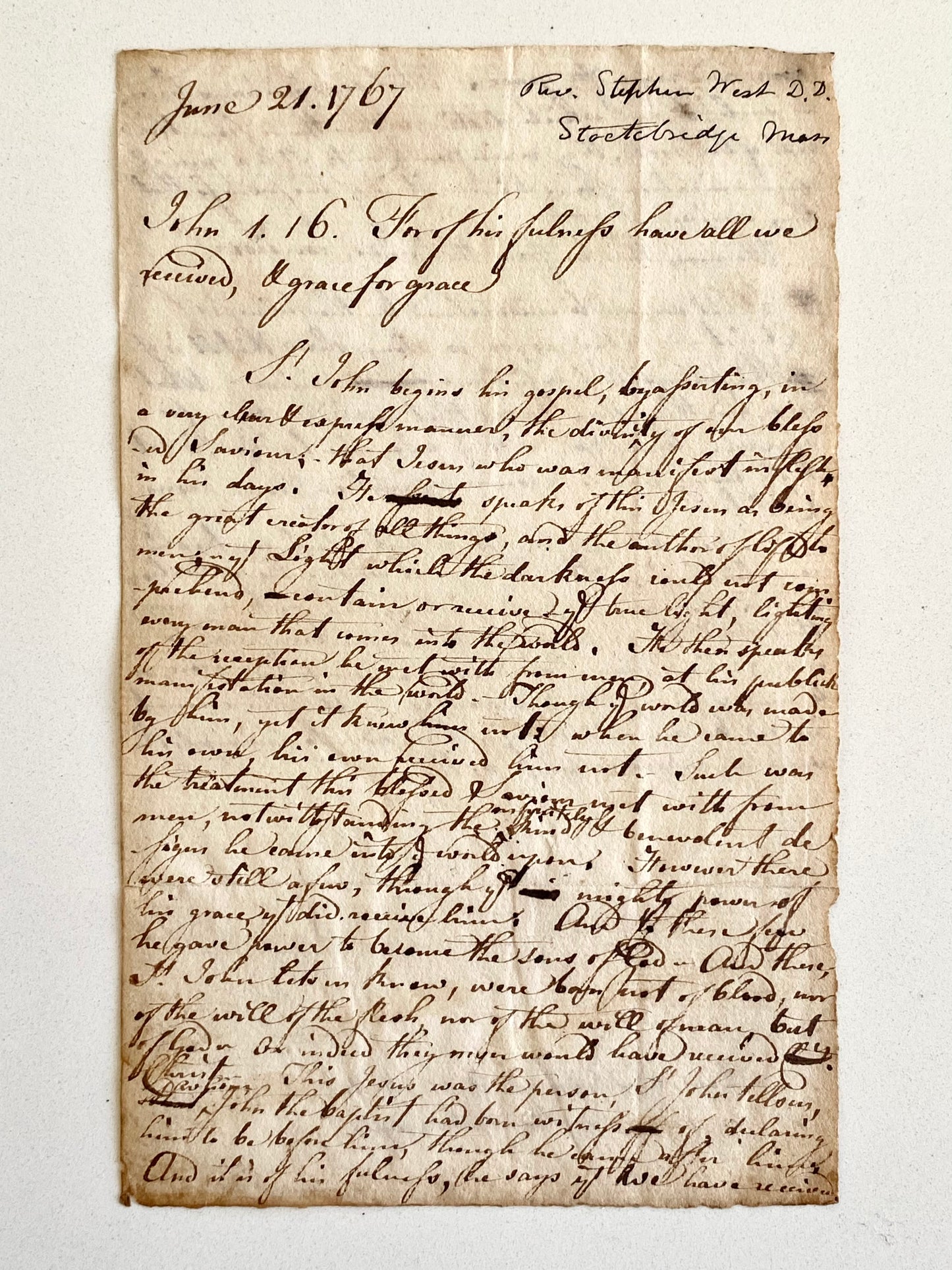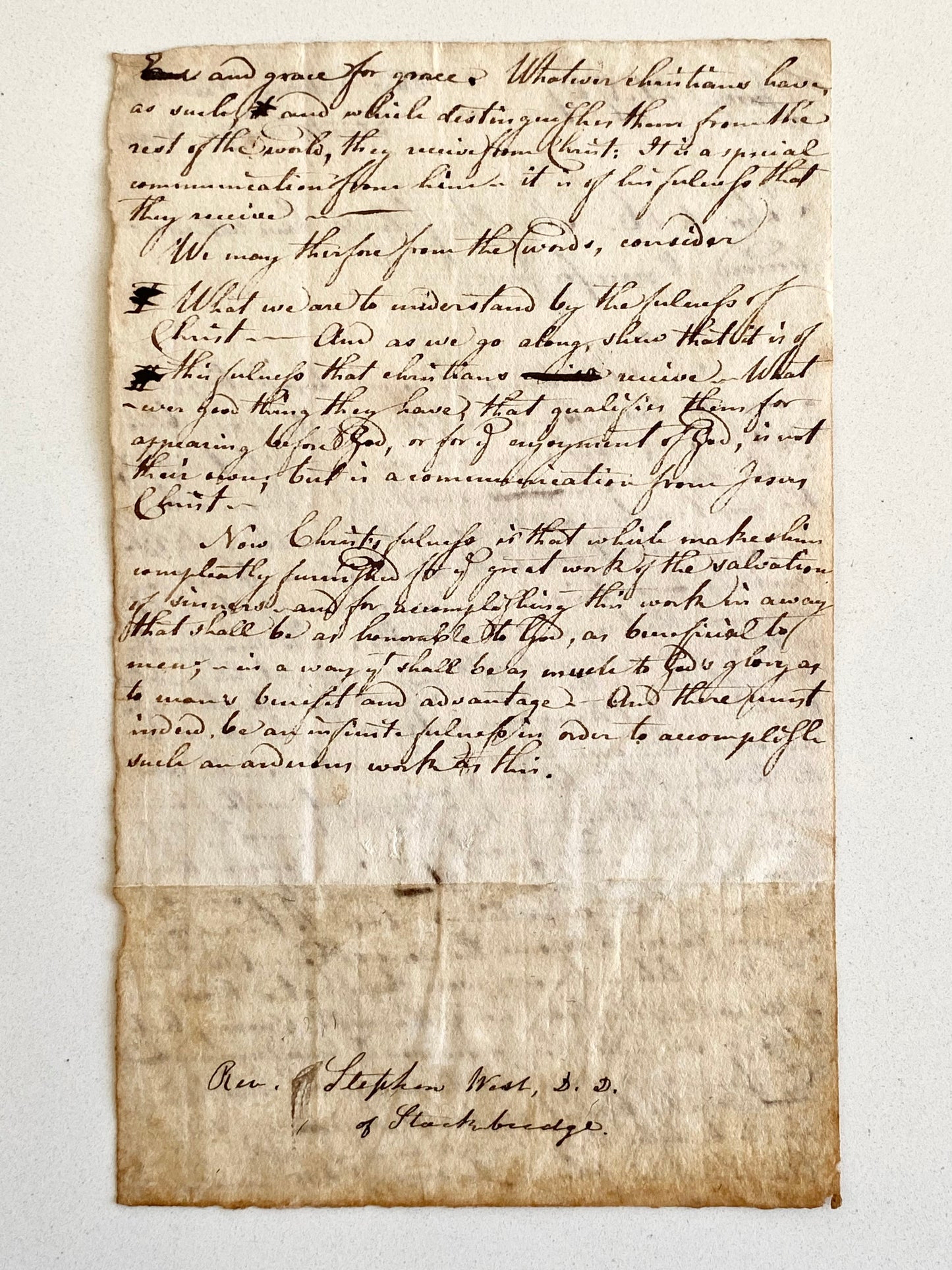Specs Fine Books
1767 STEPHEN WEST. MSs Sermon by Jonathan Edwards Successor as Missionary to the Stockbridge Indians.
1767 STEPHEN WEST. MSs Sermon by Jonathan Edwards Successor as Missionary to the Stockbridge Indians.
Couldn't load pickup availability
A very scarce manuscript sermon, seemingly not published in his Life, Ministry, and Writings by Hyde. From the superb early and mid-19th century autograph collection of Rev. Robert Crawford, son-in-law of Edward Dorr Griffin and friend of perhaps the autograph collector of the period, William Buell Sprague.
After his inglorious dismissal from Northampton, Jonathan Edwards served as the missionary, pastor, and chief educator at Stockbridge to the Stockbridge and Brotherton Indians [more properly, Mohican Indians] for 16 years. He left in 1758 to become the President of Princeton University. A replacement was found in Rev. Stephen West [1735-1819], a graduate of Yale [1755] who had studied theology under Timothy Woodbridge, predecessor to Edwards at Stockbridge. West was subsequently appointed missionary, pastor, and educator to the Stockbridge Mission in 1759, around one year after Edwards' departure.
The Mission also included a small theological school, which West ran for 30 years. In the year before his departure, two Native Americans who had left Stockbridge to study at Dartmouth returned. West, rightly, felt it would better serve the people if their own people ran the College. The Stockbridge Mission school may well have been the first Native American-run college in America.
West seems to have had a deep, abiding interest in the welfare of both the Native American population in the region and in the black population. He published an account of the life and conversion of Rose Binney, a slave who had come to Christ in Stockbridge. He had taken a special interest in her because conversions among slaves in the North were highly celebrated, perhaps as a salve to the conscience. or a way of explaining what felt intuitively to be a highly questionable situation. But his interest would have been further heightened in Rose because she was the slave of one . . . you guessed it . . . Jonathan Edwards. She had been Edwards' slave while living in Northampton and went with Edwards when he was dismissed from Northampton and moved to Stockbridge.
Edwards' interaction with slavery is complicated. By optimistic accounts, he actually performed Rose's wedding at Stockbridge. Then, when he left for Princeton, he recognized Rose and her husband's right to their own freedom. Other accounts deny he performed the wedding and say they purchased their freedom legally.
West, just younger than Jonathan Edwards, more in the generation of Jonathan Edwards Jun. may well have been more decidedly and openly anti-slavery, as Edwards Jun. and others influenced by Edwards were.
He published The Impotency of Sinners, with Respect to Repentance and Faith, No Excuse [1777], etc., and more of his writings were published in Sketches of the Life, Ministry, and Writings of the Rev. Stephen West, Late Pastor of the Church in Stockbridge, Massachusetts by Alvan Hyde.
The present 1.75pp 1767 MSs appears complete and was likely a daily reading for the Native Americans at the Stockbridge Mission who attended the school.
It is as follows:
[In the hand of Robert Crawford; upper left]. Rev. Stephen West D.D. | Stockbridge Mass.
[In the hand of Stephen West] June 21. 1767.
John 1.16. For of his fulness have all we received, & grace for grace.
St. John begins his gospel by asserting in a very clear & express manner, the divinity of our blessed Saviour; that Jesus who was manifest in flesh in his days. He speaks of this Jesus as being the great creator of all things; and the author of life to men; and the Light which the darkness could not comprehend, containing, or receive. The true light, lighting every man that comes into the world. He then speaks of the reception he met with from men at his publick manifestation in the world. Though the world was made by Him, yet it knew him not: when he came to his own, his own received him not. Such was the treatment this blessed Saviour met with from men, notwithstanding the manifestly kind & benevolent design he came into the world upon. However there were still a few, through the mighty power of his grace, that did receive him. And to those few he gave power to become the sons of God. And these St. John lets us know were born not of blood, nor of the will of flesh, nor of the will of man, but of God. Or indeed they never would have received Christ.
This Jesus was the person St. John tells us, John the baptist had been witness of declaring him to be before hi, though he came after him. And it is of his fulness, he says that we have received grace for grace. Whatever Christians have, as such, and which distinguishes them from the rest of the world, they receive from Christ: It is a special communication from him . . . it is of his fulness that they receive.
We may therefore from the words, consider
I. What we are to understand by the fulness of Christ.
II. And as we go along, shew that it is of this fulness that Christians receive. Whatever good thing they have that qualifies them for appearing before God, or for the enjoyment of God, is not their own. but is a communication from Jesus Christ.
Now Christ's fulness is that which makes him completely furnished for the great work of the salvation of sinners and for accomplishing this work in a way that shall be as honorable to God, as beneficial to men . . . in a way that shall be as much to God's glory as to man's benefit and advantage. And there must indeed be an infinite fulness in order to accomplish such an arduous work as this."
An important Colonial American MSs likely delivered at the Stockbridge [Native American] Mission.
Complete, some toning and handling, folded, lower 1/3 of verso a bit more toned.
Share




